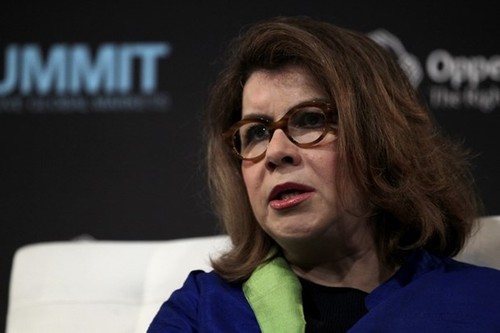 World Bank’s chief economist Carmen Reinhart (Photo: Bloomberg) World Bank’s chief economist Carmen Reinhart (Photo: Bloomberg) |
The World Bank is lowering its global growth forecast for 2022 to 3.2%, much lower than its previous forecast of 4.1%. Compared with the global GDP in 2021 of 5.7% at the peak of the COVID-19 pandemic, this year’s growth estimation is worrisome.
Grave challenges
The World Bank’s chief economist Carmen Reinhart said the that global economy is passing through a period of “exceptional uncertainty”. In an interview on Bloomberg on Tuesday, she warned of risks to the global economy. Economists agree that there is a series of serious challenges,of which the Russia-Ukraine crisis and related issues are the most serious. The armed conflict in Ukraine and Western sanctions on Russia have forced fuel and food prices to skyrocket in most countries and regions. Like the uncertain future of the Russia-Ukraine conflict, the global food price hike is also forecast to have no foreseeable end.
The resurgence of the COVID-19 pandemic has forced China, the world's second largest economy, to re-impose a large-scale blockade, which has significantly disrupted production. It puts pressure on not only China's economic activities but also the entire global supply chain as China is the world's top producer and exporter.
Over the last two years many economies have had to borrow funds for economic recovery and growth. Global debt has reached a record high level. The IMF reports that global debt increased 28%, equivalent to 256% of GDP in 2020.
Janus Henderson's Sovereign Debt Index released in April shows that global government indebtedness around the world will rise 9.5% to 71.6 trillion USD this year. Last year the data was 65.4 trillion USD, an increase of 7.8% compared to 2020. Large debts and difficult economic activities have pushed many economies in West Asia, North Africa, and South America to the verge of bankruptcy. Sri Lanka announced on April 12th its suspension of the repayment of foreign debt.
Solutions and response
Challenges and risks facing the global economy are so serious that the World Bank’s chief economist does not rule out the possibility of lowering growth forecast in the near future.
WB President David Malpass said that over the coming weeks his agency will be discussing with its Governors and Board of Executive Directors a 15-month crisis response financing package of around 170 billion USD to help countries address multiple overlapping crises, which will be bigger than the one for the COVID-19 response.
Solutions to overcome difficulties were one of the main topics at the G20’s Finance Ministers and Central Bank Governors Conference on Wednesday. Many countries have implemented countermeasures, most commonly raising interest rates, to curb inflation.
International financial institutions and world’s leading economists said that single measures within an economy can hardly solve current challenges, especially economies with limited resources.
The IMF calls for rapid debt restructuring for low-income economies participating in the G20's "Common Debt Settlement Framework" (DSSI) initiative, and proposes options to help emerging and developing economies that are not eligible to participate in DSSI to benefit from a global cooperative approach in the near term.